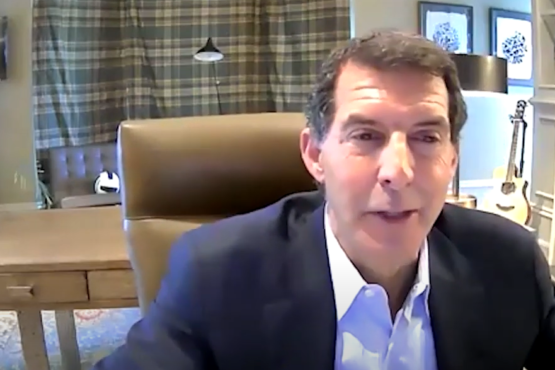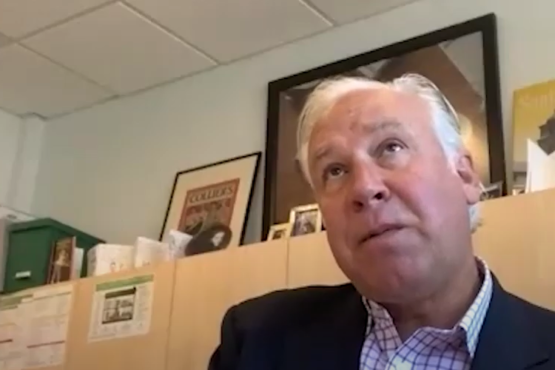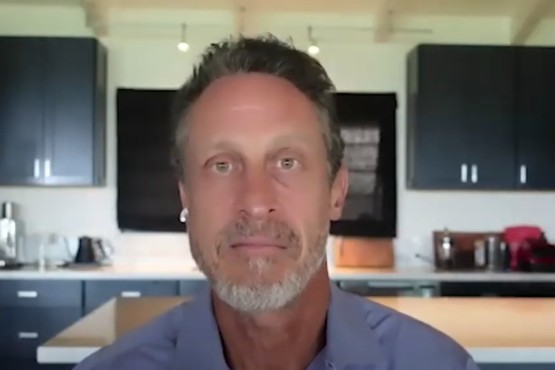In today’s episode we have Paul Ketchel, founder and CEO of MDsave joining us. Paul has always had a tireless passion for creating solutions to problems. And it came as no surprise to me when he came up with the unique, the value-based bundled approach of MDsave, the world’s first transactional healthcare marketplace. MDsave is all about transparency and consumer empowerment. It empowers patients to compare prices for healthcare services up front, potentially saving them hundreds, even thousands of dollars on costly procedures that we previously had no price transparency on. Stay tuned to hear more about how MDsave is disrupting the healthcare industry and putting an end to surprise billing.

Bill Frist: Paul Ketchel, CEO, founder, voice of MDsave and we’ll get into what MDsave is all about. But you and I have been friends for almost 25 years in lots of different capacities and there’s one question I’ve always wanted to ask and so I’ll open with that. I know you are an innovator, do you consider yourself an entrepreneur? You’ve really stuck with this, you’ve focused on this, you’ve done other things, but you’re committed to this long term. How do you define yourself?
Paul Ketchel: Yeah, I think I would say I’m an entrepreneur. I would think, ever since I was a child, I was always trying to think about how we solve more problems. And along with solving those problems, I was always thinking about how you could monetize whatever you were solving.
Bill Frist: That started very early, the monetization part?
Paul Ketchel: I was one of those kids. I think I started a baseball card selling business when I was in middle school or something. I converted a room to a store front. And I did things like that. I’d always sort of done that. But I always, it’s what drew me, I think to entrepreneurship more than anything else is just that, I’m one of those folks where I, where if you, if I pick up an item or I look at something, I’m always thinking about how they could be re-engineered to be better or more efficient. So it’s one of those things where you can’t really turn it off or you’re just always trying to solve problems. And so that was, and I think you know, being an entrepreneur is probably the right track where you get to think freely and try new things and do those type of things more than anything else.
Bill Frist: So it started young. It continues. And over the last 20 years of our relationship, it’s always been innovation. And being an innovator can be different than an entrepreneur. But now I get it because you were selling those baseball cards, you were thinking something in the background. Get the value out of it. From MDsave, when you’re on the streets and somebody says MDsave, kind of a strange word, MDsave. It’s all put together. A, what does the name mean, but more importantly, what is MDsave?
Paul Ketchel: Well you know we tried to come up with a name that just sort of described it. It’s a way for patients to save on medical care. And we wanted really frankly just a really short name that’d be a short URL on the internet. Easy to remember for folks. But what MDsave really does, is MDsave is think of it a lot like it’s Expedia for health care. So what we really do is we bundled together healthcare services, [inaudible] owned and affiliated providers and then we offer those to the public at a discounted rate, usually 40 to 60% lower than an insurance rate. And in exchange we collect the payment upfront and pay those providers and in six days or less. So essentially we’re just, if you think about MDsave, what we’re really doing is we’re just taking healthcare and we’re applying the same e-commerce strategies and metrics that have been applied to other industries, to the healthcare industry.
Bill Frist: So a service. What kind of service are you packaging to offer a consumer?
Paul Ketchel: We’re trying to really offer almost anything a consumer needs and what I would say is traditional daily medical care. And so that service goes all the way down to maybe it’s an $8 lab up to an inpatient total hip procedure. So I would always say is that we can probably service 70% of the healthcare needs or continuum. The 30% that we can’t necessarily service because we like to offer everything as a fully bundled up front price and so forth are things where there’s just really personalized variability like personalized oncology treatment for example, or things like that. But as far as what you’re having or experiencing as a patient or the needs you have for most of your life in a typical setting, we start off-
Bill Frist: So if I needed a colonoscopy, you do that.
Paul Ketchel: Yeah. So you would go on and just like on Amazon, if you were buying something there, you could type in colonoscopy and your geographic area and it would show you a list of providers and what the capitated price is to get that colonoscopy completely with each of those individual providers. And I say that because that means there’s no other bills that show up. Those are the total costs.
Bill Frist: It’s an apples and apples bills and all of a sudden something comes three months later and, but you bundle all that together.
Paul Ketchel: Yeah. And if you bundle, not only does it give a patient the ability to have price certainty to make a true apples to apples comparison, like they’re shopping for a typical item, but it also takes out what I would say has been a big problem in healthcare, which is just the billing errors and you know what’s owed and the failure of, is the claim adjudicated properly. All those type of things. I mean, I think stats today show that 90% of medical bills contain an error, and it’s just because of the amount of complexity that’s now involved in every single claim. And so by getting rid of that, having a bundled up front price, you can eliminate a lot of that.
Bill Frist: So you do a mammography or colonoscopy or a primary care visit. You mentioned a hip replacement. That seems to be pretty complicated. How do you bundle all that together?
Paul Ketchel: Well, you know, today lots of hips have been done in the United States. So we know generally what the components that are needed into a hip. We go a little bit farther in the sense that we try to approach our strategy in bundling healthcare on what everything a patient is going to need on that service. So on a hip for example, you’re going to need patient-physician consultation, you’re probably getting a diagnostic workup and some advanced imaging beforehand. Then you’re going to have a physician fee, a facility fee and anesthesia fee, you might have some pathology-
Bill Frist: You’re giving me a headache. You’re giving me a headache.
Paul Ketchel: You’re getting through all these lists.
Bill Frist: You put all that together.
Paul Ketchel: We put all that together. So we bundle all the providers together, the owned and affiliated, we offer one price and then we go a little bit further in the sense that we know with that hip, you’re probably going to need 30 PT visits postop and often that’s not included. So we put that in there too because we know that any patient who’s getting a hip is going to have to have physical therapy and that’s often not included. So we’re trying to put all that in there so that the patient knows that this is what you’re going to get in that episode. And it’s going to be included.
Bill Frist: So you strike on just that sort of quick description on the big issues that bother people today in our chaotic $3 trillion healthcare system. One is transparency. Nobody knows what they’re paying for anything in healthcare today. And I say that as a cardiac surgeon and somebody who sent thousands of bills out and had insurance companies send bills out, and the hospitals, in my name, send things out. And so the transparency, let’s come back to that. You keep talking about the consumer, is MDsave a consumer play, and then you mentioned providers too, but is your customer, is there a sort of purpose for being to make it an easy forgettable process for consumers or is it to help the providers take care of all this chaos?
Paul Ketchel: You know, the nice thing about it is you’re really solving two problems that are systemic at health care at the same time. So one is you’re getting the consumer better rates, you’re giving them clear understanding and the transparency component, it’s all transactional transparency, meaning that I don’t just see an estimate, but I can actually purchase click transact on that. So that takes a lot of-
Bill Frist: All this was on the computer?
Paul Ketchel: Yeah, they can do it on a computer or it’s also done at the point of service with the provider. So part of that is you’re solving that need, that problem that a consumer has. They just want to be able to transact, know what they’re paying, understand clearly what’s happening to them. On the flip side of that, providers are also facing problem, which is-
Bill Frist: Providers are doctors or hospitals?
Paul Ketchel: Both, you’ve got doctors, you’ve got hospitals. But again, as you said, when you’re a surgeon, you got, it’s putting all of that cost wrapped together. They’re able to actually tell a patient this is what you’re going to owe. And when a patient’s there at the provider’s office, they’re able to take a payment from that patient or transact for that patient where that’s been really pretty much impossible in the healthcare industry. I mean, if you go to a hospital today and you walk in and you sit down at the financial counselor desk and they’ve told you to come and have a procedure and you say, well, how much can I get it for if I pay cash? You’ll be sitting in that same seat three hours from now and you still won’t have an answer. And the first answer will be, well, don’t worry about it.
Paul Ketchel: Just go home and we’ll tell you how much that’s going to be later. And that’s the typical answer.
Bill Frist: 99% of the time.
Paul Ketchel: You know, providers would like to give that answer. And so it’s solving that problem that the providers have had. It’s improving their service, but it’s also letting them go ahead and collect up front, not have claims denials, resubmits, all the things that happen on the provider side. So really both of those entities are customers of ours. So we were paid a fee by providers to use the software and use this infrastructure to enable these types of transactions. And then there’s also a transactional fee that’s built into each of these bundles that’s paid by the patient and we paid credit card transaction fees and things like that out of there. But you’re solving both needs at the same time.
Bill Frist: And again, we just did it, but we did it fast.
Bill Frist: I’m a patient and at my age I get a colonoscopy every five years and I’m thinking about it because next Wednesday I’m getting a colonoscopy. But I did it probably in a more traditional way. I could go to the MDsave website and I would type in colonoscopy and type in a lot of demographic data or not?
Paul Ketchel: No, you just type in colonoscopy in the website or the app would automatically tell you based on your location, where you are. So it would predict based on your IP address that you’re sitting here in Nashville today.
Bill Frist: Okay, then you send me five places I could go?
Paul Ketchel: Yeah. So to bring up on a screen, just like if you’re buying consumer electronic products on Amazon, it would bring up maybe five, six different providers. You could see what the total price is.
Bill Frist: What do I see? Do I see the total price, we’ve covered?
Paul Ketchel: Yep.
Bill Frist: What else do I see?
Paul Ketchel: You’d see the price, you would see a profile on the provider, their education, where they practice, accreditations. We actually have a tool that aggregates sort of quality ratings from other websites. You can see that data in there and you can see office hours. There might be a provider direct phone number that you can contact and so forth. And so could see that. And then if you were to make a decision-
Bill Frist: Okay, let’s say I want to get a colonoscopy and I’ve had to wait now two months for mine, next Tuesday or Wednesday. I’d push a button and choose one of those. And then what happens?
Paul Ketchel: So what would happen is you choose that provider and a shopping cart would pop up, just as if you were buying something else online.
Bill Frist: Yep.
Paul Ketchel: If that was all you’re purchasing, then you would click checkout and just like a standard e-commerce transaction, you either put it in a credit card, make a PayPal transaction, and then there’s also an online financing option through Care Credit.
Paul Ketchel: And if so, if you’d wanted to finance that colonoscopy, you could do an instant online approval and checkout with that financing option, do monthly payments.
Bill Frist: Right then and there?
Paul Ketchel: Right then and there. And so you’d make that payment and the minute that you click that purchase button, it sends an electronic notification to the appointment desk of that provider. And in some cases it’ll launch a scheduling window, because some of them have integrated scheduling and you can do your scheduling right there. And then it will also send a copy of what we call a prepaid medical voucher to you, the patient. And that’ll be in your account on MDsave, which is free to create. You can just have a copy of that on your smart phone and it’ll also give you either the chance to schedule electronically or it’ll give you the direct number of the appointment desk of that provider to call and you can call-
Bill Frist: And all that takes about … Don’t exaggerate, but about how much time? I know I want the colonoscopy, I know I’m going to sort of make the choice. Maybe I’ve got five-
Paul Ketchel: It’s no different than I think any other e-commerce transaction. So you’ve probably got a few seconds into the search, then how long you evaluate is up to you. But once you made that evaluation, you click that purchase button, you’re going to fill out a credit card processing form and click the purchase button, and that’s about it. So it’s really just a few minutes, but you know, depending on how much time you want to take, making the decision.
Bill Frist: And then jumping ahead, let’s add a week from now they do my colonoscopy. Then what happens?
Paul Ketchel: You’ll just show up at the provider’s office. You’ll walk in, you can either show them the voucher on your phone or just give them your name, they’ll look you up. Just let them know that you were on MDsave and you’re finished.
Bill Frist: Billing after that. That’s what kills me is you get these bills and six months later, three months later come from the doctor, the facility, the hospital, the anesthesiologist. You don’t have any of that.
Paul Ketchel: And the nice thing about this is, is you’re fully paid. You won’t receive any medical bills. You know, it’s just as if you bought anything else in the real world. You’ve paid a price, you own it now. And so you’ve purchased that service, so there won’t be any other bills. And once you leave that appointment or that procedure, you’re settled up.
Bill Frist: And are you in just Tennessee or how many states are you in?
Paul Ketchel: Today we’re in about 40 states.
Bill Frist: 40?
Paul Ketchel: About 250 markets, crossing over to probably about 300 in the next couple of months. So cities and you know, it’s all over the country.
Bill Frist: And how fast are you growing?
Paul Ketchel: Well, we’re growing in patient volume about 20% month over month and from a hospital or transaction standpoint, I mean we’re growing about a hundred percent year over year right now in a number of facilities and markets and companies.
Bill Frist: Fantastic. So huge demand, filling a huge in terms of price, transparency.
Bill Frist: And now a quick word from our sponsors that make this podcast possible.
Bill Frist: For 35 years, MEDHOST has been partnering with community hospitals and specialty healthcare facilities to focus on what matters most, effectively taking care of their patients. Trusted by over a thousand health care facilities, MEDHOST offers a full suite of healthcare, IP and business solutions, including an EHR in emergency department information system. Healthcare providers need a partner who can help them meet patient needs with agility. Backed by world-class support, MEDHOST solutions are an ideal match for facilities wanting to enhance patient care. To learn more, go to medhost.com.
Bill Frist: Humana reminds small businesses that three out of four employees, prefer health insurance over a pay raise. Being a business owner is a big responsibility. At Humana, we get that. That’s why we have health insurance plans for you and your employees with flexible plans that fit your budget too. Good for business, good for you. Learn more at humana.com/goodforbusiness.
Bill Frist: And now back to the episode.
Bill Frist: Talk to me a little bit more about the pricing and transparency, sort of your larger vision. Uwe Reinhardt, who was my mentor, as you probably know for, for years and years and years, always said, “It’s the prices, stupid”, the 2003 very famous paper. The whole transparency end of it, what, what do you see that you’re changing? Is it a revolution that’s going on? Is it just a trend that’s out there? But you always hear pricing and transparency?
Paul Ketchel: The first thing is I think transparency’s a little bit of a tricky subject because I’m a strong believer that transparency’s a useless tool unless you can transact on it. And you know, I feel my fear is that by forcing providers or facilities to just post a charge master rate or transparency rate, you’re actually putting more confusion in the market instead of taking confusion out. And so, one, we’ve always believed that what you see is what you get and you should be able to buy it that day. And I always use the analogy, Amazon is a great service. We all buy lots of things on there, we use it and other e-commerce sites. But if you went on to Amazon, you saw these great deals, but you couldn’t actually buy anything, how many times would you visit Amazon? And so I think there’s a little bit of that going on.
Paul Ketchel: So one, I think that transparency’s really valuable. Patients like it, but you need to be able to transact on it. One of the great things we’ve seen in our data is over three years of monitoring and surveying every patient that purchased, we’ve had a 91 net promoter score in patient satisfaction, which I think is really powerful. I believe Amazon’s about a 68, I think Apple’s in the 40’s. Most providers are in the 30’s today. Most health plans are a negative. What’s interesting about us is when a patient makes a purchase from us, they’re still going to the same provider office. They’re still in the same facilities, they’re probably having similar outcomes, but we’re rated a 91 in patient satisfaction. The facilities might be in the 30s and what it just shows you is how important that shopping in that purchase capability and price certainty means to the patient.
Paul Ketchel: So I think that tells us a lot that not only will patients buy this way, but patients prefer to buy this way, is what the data shows you when you look at it. And so I think what it enables in the future is you’re going to see more and more patients demanding this type of shopping experience for their healthcare. I think as you’re seeing with every generation who becomes a consumer of healthcare, they’re more and more digitally integrated and those patients are continuing to purchase. I used this analogy just the other day to talk, but I’ll always say that when we were growing up, your parents always tell you, don’t ride with strangers, don’t ride with strangers. And today you walk outside and you pull out the Uber app. We ride with five strangers a day, all because it’s a technology platform that drives that. And so I think that the same thing, the same type of mindset is starting to apply to healthcare and you’re seeing that.
Paul Ketchel: So one, I think this type of service is going to be the mainstream service. And this is not unusual because online purchasing, e-commerce driven transactions have become the mainstream of purchasing all other consumer-driven industries. So it’s unlikely that healthcare is going to be different than that. The second thing I would say is as we’re progressing, you’re seeing more and more large e-commerce players come into this and what lots of big data and online transactions enables you to go even further in these experiences. So I see experiences now where once you bring someone into that online ecosystem where we’ve had such a problem with interoperability in healthcare and porting health care records and managing person’s care, if a person’s living inside on an online ecosystem, now we can prompt them for care.
Paul Ketchel: For example, you turn 50 now it’s time for that colonoscopy. A lot like you get prompted by other e-commerce sites based on your purchasing habits and your behavior. So you’re going to see, I think those things start to happen. The other thing I think you’re going to start to see with patients is that big data and big analytics that run in the online world will start to be applied to healthcare. So for example, you’ll see targeting of a patient based on this particular procedure, maybe that colonoscopy we searched, knowing your demographic, where you live, what your shopping behaviors are like, you may get different type of pricing that makes you more likely to have that service or convert into [inaudible] healthcare. So I think you see those types of tools open. And then I also think that where you’re moving as these type of purchases and transactions become more mainstream, it also opens up the ability on the provider side to do things that we’ve really been far, far behind on.
Paul Ketchel: So for example, in a facility, a hospital may have an MRI center that’s staffed 24 hours a day to take call from the ambulance service, but no one’s really using it typically without emergency between the hours of 11:00 PM and 5:00 AM. So what I think you’ll start to see through technology is you’ll see inventory based pricing, a lot like a hotels.com. So if we’ve got empty beds or we got empty rooms or empty procedures, that price will drop almost like a surge pricing and ride share services. So it gives you the ability to do inventory based pricing, surge based pricing, predictive analytics. And I think that all that can also lead to starting to really address some of the major health problems that we have.
Paul Ketchel: So for example, take diabetics in the country. If we take those diabetics and we know that this person’s financial situation is X, they’re going to have a difficulty being a compliant patient with what they should do each year. We can go ahead and build a bundle for them, either for them to purchase or for their payer, or for Medicare or Medicaid to purchase, which not only includes their medications, but maybe those wound checks, those checkups, those A1C labs and build that bundle so that those patients have compliancy based on removing those financial burdens and having better checks. So all of those things that I think we’ve struggled with in the siloed, fragmented healthcare industry, a lot of those walls start to break down when technology almost becomes the leader.
Bill Frist: That’s what I was going to ask, the MDsave has been around how long?
Paul Ketchel: The company was started in 2012 and went to market with the first patients at about mid 2013.
Bill Frist: And if you look over that, the history of the last seven years and then you project out over the next five, and there’s been a huge growth. But clearly your vision is it’s going to really take off with even more growth. What is the limiting factor been? Has it been technology or has it been cultural change or has it been legacy systems? How do you interpret that?
Paul Ketchel: You know, a lot of it is, I would say the biggest hurdle has been cultural change, which I think has been not just the biggest hurdle for MDsave, but other innovators in the healthcare industry. I mean this is a very sort of entrenched industry with an old way of thinking and something that’s held things back a bit. I would say if we were to go back in time five years ago with MDsave, I would show this to a hospital administrator and frankly they were scared to death. You know, the first response was, Oh my God, everyone’s going to know what we charge. The insurers are all going to cut my rates. We’re going to be out of business in six weeks. What happens if all these patients actually know and they choose, knowing all these things. There was just a lot of anxiety about, you know, just change is scary to folks.

Paul Ketchel: And so I think fast forward to today and now you’re having insurance plans where the majority of patients are paying for a large portion of their care out of pocket because of their deductibles and their employer plan designs and so forth. And now there is this need has to be solved and some of the shopping capability now is being asked for by the same people who were running from it five years ago and how you service that. So I think that’s helping change that. So we should’ve been doing this a decade ago and all the other industries were doing this a decade ago. Culturally, I’ve had other hospital administrators say for example, our providers say, “Well healthcare is just different. It’s just so personal. It’s so complicated. It’s just not like buying something online or trading a commodity.” In my response to always them, as I said, you know, it’s really not that complicated online.
Paul Ketchel: Human anatomy hasn’t really changed much over the last a hundred thousand years. Our standards of care haven’t changed a whole lot, decade to decade. But if you take something like the travel industry, take an airline ticket, you’re buying an airline ticket based on capacity of seats that’s open, rates that are there. Then once you have that airline ticket, you’ve got flights that are canceled, flights that are delayed, you’ve got maintenance that’s moving around. There’s all these fluctuating factors taking place in real time changing a typical travel experience today. And we manage all of that with technology and that’s so much more dynamic and much more complicated than a healthcare transaction. I mean if we’re doing a cardiac stent, we pretty much know from 60 million claims what a cardiac stent looks like and there’s not a lot of variation. But when we’re buying that airline ticket, there’s weather, there’s delays, there’s things, you know, everything’s changing minute to minute.
Paul Ketchel: So I’ve never been a believer as an innovator that this problem was some magic box that couldn’t be solved or things can be applied to. I think that’s just an old way of thinking. We’ve got to change that. I mean, in fact, I would say healthcare is an easier problem to solve with technology than many of the things that we’ve already solved.
Bill Frist: I think that’s so wise. That it’s a solvable problem because a lot of people, even in framing the argument, as you said, basically say it is just too different. The traditional, whether it’s technology, whether it’s marketing, whether it’s fundamental economic [inaudible 00:00:25:33], don’t apply when in truth they do. Let me ask you just because on the innovation side and sort of where we started, when you talk to other entrepreneurs, and again I had to even questioned, are you an entrepreneur because you’ve grown so fast and doing so well that you’re beyond sort of the startup early phase, but what advice do you give them, to the entrepreneurs who sort of travel, are traveling somewhere along the same road that you’ve traveled over the last seven years with this one company?
Paul Ketchel: You know, I think about that a lot actually. You know, my kids are young kids, they’re sort of already ask you the entrepreneurial questions. So I think about it. You know, the first thing I think is, one of the most important factor is you got to have a lot of self confidence, meaning that you’re going to be told that you’re wrong every day. You’re going to be told that this isn’t going to work 50 different ways by people who are very esteemed and very experienced. And I think the first thing I think any entrepreneur that really wants to effect change and especially an innovator, you have to have conviction that you’re right when everyone else is wrong and be able to really drive and focus on that. So I think that’s the first thing. The other thing I would say is you can’t be afraid of risk, because then to enact great change, you have to take great risks. And I think that’s a really important factor.
Bill Frist: [crosstalk] Or is that learned?
Paul Ketchel: You know, it’s funny, but I feel like I’m a believer that entrepreneurs are born, not learned. Because I do think that you can take someone who may not be genetically an entrepreneur and they might dabble into business, but eventually it gets hard to bet the farm over and over and over again. You have to be a certain personality I think to be able to do that.
Bill Frist: Come back again and again.
Paul Ketchel: And I also think for people who aren’t very risk adverse, I think it’s really easy to become paralyzed and sit still when folks that are more experienced than you or older that you tell you, “Don’t do this or this isn’t going to work.” I think you take that advice to heart easier. So I think that’s, I think those are the-
Bill Frist: It’s an added component. That’s why you were selling baseball cards at a young age. And your kids are going to probably be doing the same thing.
Paul Ketchel: Yeah. And the other thing about it is too is, I think about this often because I remember, I grew up with sort of a blue collar family and I could remember, you hear parents sometimes say to their children when you’re asking about businesses and kids are starting to get curious and you say, “Well, you know, it takes money to make money.” And there’s some times I think that I always say that one of the biggest misnomers that was told to me through elementary school, not just by my parents but by teachers and other folks you ask about it was, that there was this idea that if you didn’t have access to wealth, you could never build these companies or have these initiatives because it took capital. And I think that that’s the most damaging advice you could give children or young entrepreneurs coming up because with a good idea, if you’ve got good idea and you’ve got conviction and you believe in yourself, you can find capital. It’s not an easy road, but I think you can get there.
Paul Ketchel: And I think that if you look at the real great innovators of our time in the past, most of those innovators came from that same experience. And I think actually that those backgrounds of growing up like that and actually I think drives entrepreneurs to higher success.
Bill Frist: Accelerates it. Opens that whole perspective of growth.
Paul Ketchel: And there’s no magic recipe. But I do think that the confidence and the fight and the experience of hard work and that structure, I think all comes back to being skills you lean on later down the road.
Bill Frist: And ultimately success. So in closing, your vision, which I think you articulate beautifully and it’s based on the experience and it shows the advances in technology change in culture, youth, the younger people coming in, comfort levels and the sort of waste inefficiency that is just a lot of problems to solve and they can be solved is really sort of beautifully constructed. So let’s close on, are you optimistic that we can capture that dream of and accountability and a educated consumer, which drives this system? Are you optimistic or do you have your doubts or are you going to be patient in getting there? How do you describe it?
Paul Ketchel: No, I would say I’m more optimistic than ever. When we started this, we’ve already seen a huge shift in the consumer behavior just in the last five years. And when you look at those satisfaction scores and then you look at the data and if you step back with an unbiased eye and look at how do these patients transact, how are they shopping? How are they looking? You find that, like I mentioned before, that this isn’t just a way to purchase, but it’s a preferred way of purchase. And I feel that the efficiencies that are being wrung out of the system by doing this are so massive that there’s no way it can be ignored. And I’ll always use the example that if you think about a traditional healthcare claim today, you’ve got once a patient’s been seen, you put it in a piece of billing software that the providers are paying for or an EHR.
Paul Ketchel: Then you pay a billing company of to bill it. Then you got a claims processor and then you get a clearing house that’s take it a piece to transmit that data back and forth to a payer. And then usually it returns at least once that claim on that same infrastructure. Then you have a billion integrity specialists that reviews and then it goes to a debt collector, an early out. You know, if you think about the healthcare industry today, we’ve got 10 to 12 intermediaries that sit in the middle of every healthcare transaction with only one purpose just to transact a payment. And in no other industry does this exist. And so what you’re seeing in transparency and the ability to shop is you’re purging that system of 10 to 12 intermediaries that really, in the year 2019, there’s no reason for them to be there.
Paul Ketchel: And if you think about, going back to that travel analogy, in the 1980s if you were to go on a long trip, you had to hire a travel agent because you needed a travel agency to coordinate car rentals, hotel stays, airfares and transfers. And we, with technology, removed all those intermediaries, the same thing is happening in healthcare. And so where we’re sitting today, I don’t think that even those folks who are resistant to change, I don’t think there’s any way to stop the change. I mean I think I feel very strong that the genie’s out of the bottle. This isn’t going to stop. And for those folks in the health care industry, this is something to pay close attention to. You need to innovate because if you sit on the sideline too long, it’s going to come so quickly, you’ll get caught.
Paul Ketchel: And I use this analogy too, that when Amazon started in the book business, it was initially really dismissed as, “Well, it’s a cheaper way to buy books. Value-based customers will buy books this way”, but people like to go to their bookstore. They like to spend time in the bookstore, they like to sit at the cafe, look at the different sections, and people did enjoy that experience, but they didn’t enjoy that experience enough to pay twice as much. Do you have that experience in healthcare? The thing about healthcare is, no one’s really enjoying a doctor’s visit to start out with, and they really don’t want to pay twice as much for it. So the idea that somehow this is not going to change, I think is a big misconception. So I’m very optimistic that you’re going to see rapid change.
Bill Frist: Paul Ketchel, MDsave, you’re an innovation entrepreneur and I will say just about more than anybody I talked to a real visionary of where healthcare can go, should go and, in all likelihood will go. Thank you very much for being with us.
Paul Ketchel: Yeah, thank you.
Bill Frist: Thank you, Paul.
Paul Ketchel: Thanks.
Bill Frist: Appreciate it.
Bill Frist: This episode of a Second Opinion was produced by Todd Schlosser and Motus Creative Group team and Snapshot Interactive. You can subscribe to a Second Opinion on Apple podcast or wherever you are listening right now. And be sure to rate and review a Second Opinion so we can continue to bring you great content.
Bill Frist: You can get more information about the show, its guest and sponsors at ASecondOpinionpodcast.com, that’s ASecondOpinionpodcast.com. Thank you again to our sponsors MEDHOST in Humana. Be sure to join us for our next episode with Justin Lanning, the innovative CEO who’s finding care solutions to address a new crisis of opioid dependency in babies born to addicted mothers. A Second Opinion broadcast from Nashville, Tennessee, the nation’s Silicon Valley of health services where we engage at the intersection of policy, medicine, and innovation.




